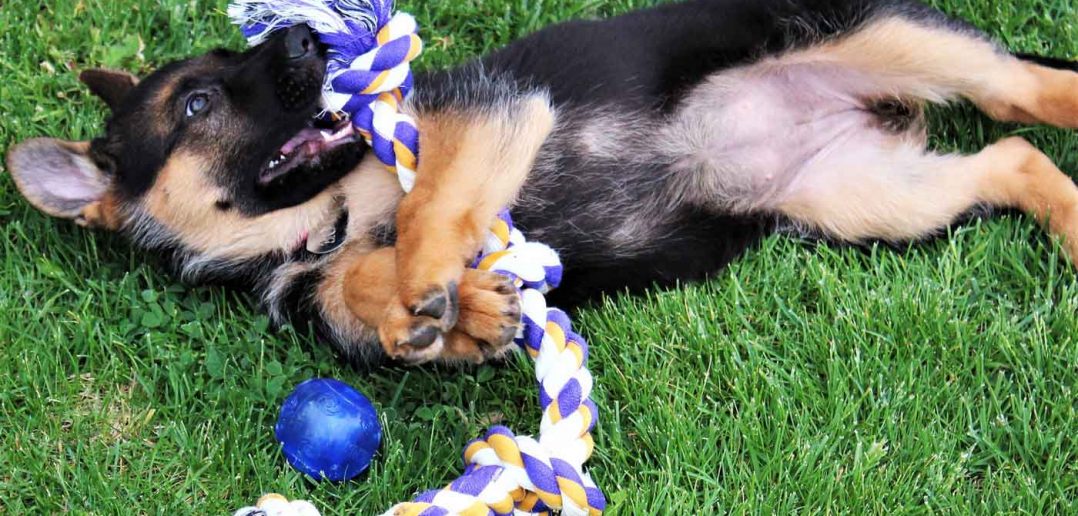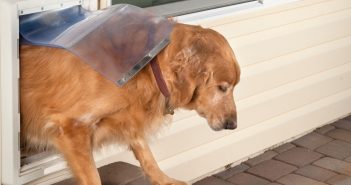Belonging to the herding group of dog breeds, German shepherd dogs represent about five percent of American Kennel Club registered dogs and have steadily risen in popularity since the 1950’s. Highly intelligent, eager to please their owners and incredibly loyal, German Shepherds are not only great family companions but make excellent police and military dogs with the proper training.
German Shepherd Colors
Common color variations seen in German Shepherds include black, gray, black and tan, sable, brown and silver and black. Coats can be thick and dense, fluffy and dense, short or long. German shepherd puppies are born with fuzzy coats that change into their permanent, slick, adult coats fairly quickly.
At six months, pups may start losing some coat darkness and adopt lighter colors until they present the classic adult “blanket” or “saddle” when two years old. Noticeable color changes happen to most breeds of German Shepherd puppies during their first year.
Canine Vaccinations
Puppies can start receiving vaccinations when they are around 10 weeks old. Rabies, distemper, hepatitis (adenovirus type 1 and 2 diseases causing respiratory illnesses, kennel cough and infectious canine hepatitis), parainfluenza and parvovirus are core vaccinations all dog breeds should receive.
Non-core vaccinations for dogs include:
- Bordetella (for kennel cough)
- Leptospirosis (bacterial disease affecting the liver and kidneys)
- Lyme disease (applicable to dogs living in specific geographical locations)
- Coronovirus (causes chronic diarrhea)
- Canine Influenza Virus (CIV) (highly contagious disease producing flu-like symptoms)
Training and Raising a German Shepherd
Start leash-training your puppy early. Daily walks and exercise sessions are necessary for satisfying a German Shepherd’s innate desire for companionship and physical/mental stimulation. Since these dogs still retain a strong herding instinct, owners will need to ensure their German Shepherd receives plenty of outdoor activity. With their urgency for pacing and roam indicative of a herding breed, you should consider fencing in your yard or install an hidden dog fence to allow your dog to trot around purposefully when he feels like it. This authoritative gait practiced by older German Shepherd puppies and adults clearly show their instinct for herding livestock.
As one of the easiest dog breeds to house train, German Shepherds learn quickly to “tell” owners when they need to go outside. Take puppies outside frequently, show them the same spot on which they can relieve themselves and reward them with “good boy or good girl!” and vigorous petting when they successfully make it outdoors. Learn more about German Shepherd puppy training here.
Grooming Your German Shepherd Puppy and Adult Dog

This breed of dog has a sheddable exterior coat and a thicker interior coat that never sheds. Brushing the coat every day (especially during shedding season) is necessary if you want to avoid loose hair on furniture and clothes. Bathe your puppy or adult dog only when they need it (getting into mud or other substances and elimination of fleas). Too much bathing will dry out the skin and make the dog itch.
You can help protect your dog from fleas, ticks and other parasites by:
- Inspecting your pet’s fur thoroughly after every walk or outside activity. Brush the fur to help remove insects and plant debris and check their paws for stuck pebbles or thorns.
- Keep a close eye on your dog for signs of excessive scratching, biting or clawing behavior. Monitor the area for signs of fleas, ticks, allergic dermatitis or scabies.
- If your dog appears tired, uninterested in eating or drinking and begins vomiting, take him to the veterinarian to rule out a tick-borne illness.
- Wash your dog’s chew toys and bedding once a week in the summer to reduce the risk of fleas.
Do German Shepherds Have Particular Health Problems?

German Shepherd puppies and dogs are generally healthy and only suffer medical issues due to inbreeding. Elbow or hip dysplasia may affect older dogs that have been inbred. Joint dysplasia arises from improper development of the elbow or hip joint. Treatment involves minimally invasive arthroscopic surgery, medications or exercise.
Because they have large, upright, open ears, these dogs may experience ear infections when bacteria proliferate in the ear and causes infections. Keeping your dog’s ears clean and dry is a excellent way to prevent recurring ear infections.
Taking your dog for yearly wellness and dental checks provided by a veterinarian is the best way to ensure your German Shepherd enjoys many years of good health.
German Shepherd Puppies For Sale Or Adoption?
Did you know you can get cute, lovable German Shepherd puppies for free? Dog rescues that adopt and re-home dogs often have programs that allow people to adopt German Shepherd puppies for free. Instead of searching for puppies for sale, check out rescue organizations to see whether they offer puppies for at no or minimal costs.






